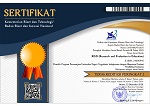Development and validation of a self-assessment-based instrument to measure elementary school students’ attitudes in online learning
Wiputra Cendana, Universitas Pelita Harapan, Indonesia
Mark Ayres, Appleton Academy, United Kingdom
Azim Abdurakhmanovich Yuldashev, Chirchik State Pedagogical University, Uzbekistan
Sri Panca Setyawati, Universitas Nusantara PGRI Kediri, Indonesia
Abstract
Keywords
Full Text:
PDFReferences
Abdurrahmansyah, A., Sugilar, H., Ismail, I., & Warna, D. (2022). Online learning phenomenon: From the perspective of learning facilities, curriculum, and character of elementary school students. Education Sciences, 12(8), 1–18. https://doi.org/10.3390/educsci12080508
Aiken, L. R. (1985). Three coefficients for analyzing the reliability and validity of ratings. Educational and Psychological Measurement, 45(1), 131–142. https://doi.org/10.1177/0013164485451012
Anderson, L. W., & Bourke, S. F. (2000). Assessing affective characteristics in the schools (2nd ed.). Routledge.
Andrade, H. L. (2019). A critical review of research on student self-assessment. Frontiers in Education, 4, 1–13. https://doi.org/10.3389/feduc.2019.00087
Apriyanti, N., & Burhendi, F. C. A. (2020). Analisis evaluasi pembelajaran daring berorientasi pada karakter siswa [Analysis of evaluation of online learning that is oriented to students’ characters]. Prosiding Seminar dan Diskusi Nasional Pendidikan Dasar 2020, 1–9.
Bali, M. M. E. I., & Musrifah, M. (2020). The problems of application of online learning in the affective and psychomotor domains during the COVID-19 pandemic. Jurnal Pendidikan Agama Islam, 17(2), 137–154. https://doi.org/10.14421/jpai.2020.172-03
Black, P., & Wiliam, D. (2010). Inside the black box: Raising standards through classroom assessment. Phi Delta Kappan, 92(1), 81–90. https://doi.org/10.1177/003172171009200119
Borožová, H., & Rydval, J. (2014). Analysis of exam results of the subject ‘Applied mathematics for IT’. Journal on Efficiency and Responsibility in Education and Science, 7(3–4), 59–65. https://doi.org/10.7160/eriesj.2014.070303
Boud, D., & Falchikov, N. (1989). Quantitative studies of student self-assessment in higher education: A critical analysis of findings. Higher Education, 18(5), 529–549. https://doi.org/10.1007/BF00138746
Calderón, J. L., Morales, L. S., Liu, H., & Hays, R. D. (2006). Variation in the readability of items within surveys. American Journal of Medical Quality, 21(1), 49–56. https://doi.org/10.1177/1062860605283572
Damanhuri, D., & Lestari, R. Y. (2021). The cultivation of social attitudes through civic education learning in the pandemic era as an effort to build students’ social skills. Gagasan Pendidikan Indonesia, 2(2), 93–98. https://doi.org/10.30870/gpi.v2i2.12721
Drake, S. M., & Reid, J. L. (2020). 21st century competencies in light of the history of integrated curriculum. Frontiers in Education, 5, 122. https://doi.org/10.3389/feduc.2020.00122
Eagly, A. H., & Chaiken, S. (2007). The advantages of an inclusive definition of attitude. Social Cognition, 25(5), 582–602. https://doi.org/10.1521/soco.2007.25.5.582
Erawati, G. A. P. S. A., Widiana, I. W., & Japa, I. G. N. (2021). Elementary school teachers’ problems in online learning during the pandemic. International Journal of Elementary Education, 5(4), 562–573. https://doi.org/10.23887/ijee.v5i4.39233
Fauzani, R. A., Senen, A., & Retnawati, H. (2021). Challenges for elementary school teachers in attitude assessment during online learning. Journal of Evaluation and Research in Education, 5(3), 362–372. https://doi.org/10.23887/jere.v5i3.33226
Ghunu, N. M. S. (2022). The challenges of remote area elementary schools in thematic curriculum implementation. International Journal of Instruction, 15(2), 19–36.
Hair, J. R., Black, W. C., Babin, B. J., & Anderson, R. E. (2009). Multivariate data analysis (7th ed.). Pearson.
Hidayat, M. T., & Listya, T. D. (2021). The implementation of social attitude assessment in elementary schools: A study of Indonesia. Elementary Education Online, 20(1), 575–581. https://doi.org/10.17051/ilkonline.2021.01.48
Hooper, D., Coughlan, J., & Mullen, M. R. (2008). Structural equation modelling: Guidelines for determining model fit. Electronic Journal of Business Research Methods, 6(1), 53–60.
Hu, L., & Bentler, P. M. (1999). Cutoff criteria for fit indexes in covariance structure analysis: Conventional criteria versus new alternatives. Structural Equation Modeling: A Multidisciplinary Journal, 6(1), 1–55. https://doi.org/10.1080/10705519909540118
Jöreskog, K. G., & Sörbom, D. (2006). Lisrel 8.80 [Computer software]. Scientific Software International.
Mardapi, D. (2004). Pedoman khusus pengembangan instrumen dan penilaian ranah afektif [Specific guidelines for instrument development and assessment in affective domain]. Lintas Media.
Masry-Herzallah, A., & Stavissky, Y. (2021). The attitudes of elementary and middle school students and teachers towards online learning during the corona pandemic outbreak. SN Social Sciences, 1(3), 1–23. https://doi.org/10.1007/s43545-021-00083-z
McCoach, D. B., Gable, R. K., & Madura, J. P. (2013). Instrument development in the affective domain: School and corporate applications (3rd ed.). Springer.
Nunnally, J. C., & Bernstein, I. H. (1994). Psychometric theory (3rd ed.). McGraw-Hill.
Prihatni, Y., Supriyoko, S., & Rahmatang, R. (2019). Development of attitude competency assessment test based on teaching of Ki Hadjar Dewantara in elementary and secondary school. Jurnal Prima Edukasia, 7(1), 1–8. https://doi.org/10.21831/jpe.v7i1.21517
Reeves, M. F. (1990). An application of Bloom’s taxonomy to the teaching of business ethics. Journal of Business Ethics, 9(7), 609–616. https://doi.org/10.1007/BF00383217
Retnawati, H. (2016). Analisis kuantitatif instrumen penelitian [Quantitative analysis of research instrument]. Parama Publishing.
Setiawan, A., Fajaruddin, S., & Andini, D. W. (2019). Development an honesty and discipline assessment instrument in the integrated thematic learning at elementary school. Jurnal Prima Edukasia, 7(1), 9–19. https://doi.org/10.21831/jpe.v7i1.23117
Tavakol, M., & Wetzel, A. (2020). Factor analysis: A means for theory and instrument development in support of construct validity. International Journal of Medical Education, 11, 245–247. https://doi.org/10.5116/ijme.5f96.0f4a
Wu, W.-H., Kao, H.-Y., Wu, S.-H., & Wei, C.-W. (2019). Development and evaluation of affective domain using student’s feedback in entrepreneurial massive open online courses. Frontiers in Psychology, 10, 1–9. https://doi.org/10.3389/fpsyg.2019.01109
DOI: https://doi.org/10.21831/reid.v9i2.52083
Refbacks
- There are currently no refbacks.

This work is licensed under a Creative Commons Attribution-ShareAlike 4.0 International License.







.png)







